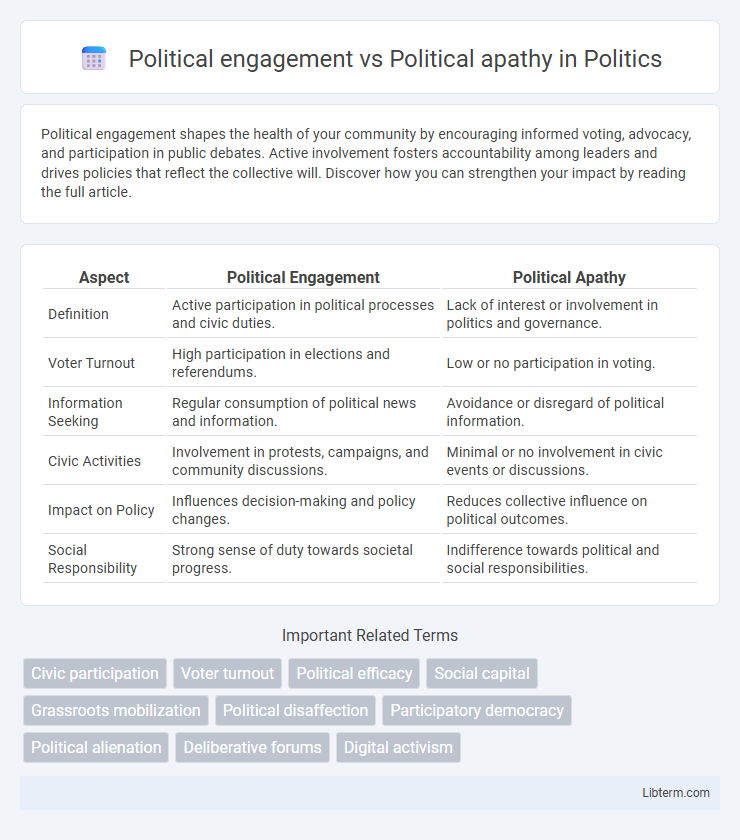Political engagement shapes the health of your community by encouraging informed voting, advocacy, and participation in public debates. Active involvement fosters accountability among leaders and drives policies that reflect the collective will. Discover how you can strengthen your impact by reading the full article.
Table of Comparison
| Aspect | Political Engagement | Political Apathy |
|---|---|---|
| Definition | Active participation in political processes and civic duties. | Lack of interest or involvement in politics and governance. |
| Voter Turnout | High participation in elections and referendums. | Low or no participation in voting. |
| Information Seeking | Regular consumption of political news and information. | Avoidance or disregard of political information. |
| Civic Activities | Involvement in protests, campaigns, and community discussions. | Minimal or no involvement in civic events or discussions. |
| Impact on Policy | Influences decision-making and policy changes. | Reduces collective influence on political outcomes. |
| Social Responsibility | Strong sense of duty towards societal progress. | Indifference towards political and social responsibilities. |
Understanding Political Engagement
Political engagement encompasses activities such as voting, participating in protests, and engaging in community discussions, reflecting active involvement in the political process. High levels of political engagement correlate with increased awareness of policy issues and stronger advocacy for democratic principles. Understanding the factors that motivate political engagement, including education, social influence, and access to information, helps address political apathy and strengthens civic participation.
Defining Political Apathy
Political apathy refers to a widespread lack of interest, enthusiasm, or concern for political processes and activities, often resulting in low voter turnout and minimal civic participation. It manifests through disengagement from political discussions, reluctance to vote, and indifference toward governmental policies and social issues. Understanding political apathy is crucial for addressing democratic deficits and promoting active citizenship in modern societies.
Factors Influencing Political Participation
Socioeconomic status, education level, and political efficacy significantly influence political participation, with higher income and education correlating to increased engagement. Social networks and community involvement provide platforms for political discussion, enhancing participation, while perceived government responsiveness fosters motivation to vote or protest. Conversely, political apathy often stems from distrust in institutions, lack of interest, and feelings of disenfranchisement, reducing active involvement in political processes.
Causes of Political Apathy
Political apathy often stems from factors such as lack of trust in government institutions, perceived inefficacy of individual participation, and limited political knowledge or awareness. Socioeconomic barriers, including low income and education levels, contribute significantly to disengagement from political processes. Media bias and negative portrayals of politics also discourage active involvement by fostering cynicism and disillusionment among citizens.
The Role of Education in Shaping Political Attitudes
Education significantly influences political engagement by fostering critical thinking skills and awareness of civic responsibilities, leading to higher voter turnout and active participation in democratic processes. Studies show individuals with higher educational attainment are more likely to engage in political discussions, advocacy, and community involvement, reducing political apathy. Civic education programs integrated into school curricula enhance knowledge of governmental systems and promote informed political attitudes, thus shaping more politically active citizens.
Impact of Media on Political Involvement
Media significantly shapes political involvement by influencing public opinion and disseminating information, which can either mobilize voters or contribute to political apathy. Social media platforms amplify political discourse, enabling grassroots movements and increasing awareness, yet also risk spreading misinformation that discourages participation. Traditional media's framing of political issues affects citizens' perceived efficacy and trust in the political system, directly impacting voter turnout and engagement levels.
Consequences of Low Political Engagement
Low political engagement often leads to weakened democratic processes and diminished accountability among elected officials. When voters abstain from participating in elections or public discourse, policy decisions may skew towards special interests, undermining representative governance. This apathy can result in decreased public trust, reduced government responsiveness, and the erosion of civic rights over time.
Strategies to Combat Political Apathy
Targeted civic education programs increase voter awareness by highlighting the impact of political participation on community development. Social media campaigns that promote transparent governance and involve influencers can mobilize younger demographics to engage actively in politics. Establishing community forums encourages dialogue between citizens and policymakers, fostering trust and a sense of political efficacy.
Youth Perspectives on Politics
Youth perspectives on politics often reveal a divide between political engagement and political apathy, with many young individuals voicing strong support for social justice and climate change initiatives. Studies show that youth engagement is frequently driven by digital activism on platforms like TikTok and Twitter, where political discourse shapes their awareness and participation. Conversely, political apathy among youth can stem from distrust in traditional institutions and a perceived lack of representation, leading to lower voter turnout rates in elections.
The Future of Political Engagement
The future of political engagement hinges on the integration of digital platforms and youth involvement, reshaping how citizens participate in democratic processes. Innovations such as online voting, social media activism, and political education apps are driving higher engagement rates and reducing political apathy among younger generations. Data from recent studies indicate a growing trend toward issue-based activism and real-time political dialogue, signaling a transformative shift in civic participation globally.
Political engagement Infographic

 libterm.com
libterm.com